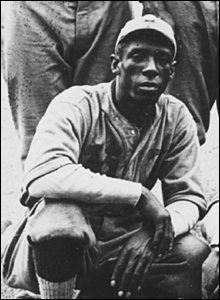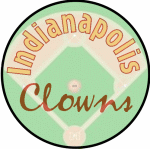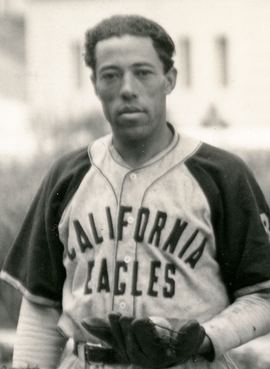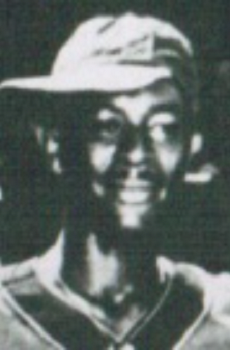Related Research Articles
The Negro leagues were United States professional baseball leagues comprising teams of African Americans. The term may be used broadly to include professional black teams outside the leagues and it may be used narrowly for the seven relatively successful leagues beginning in 1920 that are sometimes termed "Negro Major Leagues".
The Brooklyn Royal Giants were a professional Negro league baseball team based in Brooklyn, New York. Formed in 1905 by John Wilson Connor (1875–1926), owner of the Brooklyn Royal Cafe, the team initially played against white semi-pro teams. They were one of the prominent independent teams prior to World War I before organized league play began.

José Colmenar del Valle Méndez was a Cuban right-handed pitcher and manager in baseball's Negro leagues. Born in Cárdenas, Matanzas, he died at age 43 in Havana. Known in Cuba as El Diamante Negro, he became a legend in his homeland. He was one of the first group of players elected to the Cuban Baseball Hall of Fame in 1939. He was elected to the National Baseball Hall of Fame and Museum in 2006.
The Zulu Cannibal Giants were an American Negro league baseball team, formed in 1934 by Charlie Henry in Louisville, Kentucky.

The Indianapolis Clowns were a professional baseball team in the Negro American League. Tracing their origins back to the 1930s, the Clowns were the last of the Negro league teams to disband, continuing to play exhibition games into the 1980s. They began play as the independent Ethiopian Clowns, joined the Negro American League as the Cincinnati Clowns and, after a couple of years, relocated to Indianapolis. Hank Aaron was a Clown for a short period, and the Clowns were also one of the first professional baseball teams to hire a female player.

The Cuban Stars were a team of Cuban professional baseball players that competed in the United States Negro leagues from 1907 to 1930. The team was also sometimes known as the Cuban Stars of Havana, Stars of Cuba, Cuban All-Stars, Havana Reds, Almendares Blues or simply as the Cubans. For one season, 1921, the team played home games in Cincinnati, Ohio, and was known as the Cincinnati Cubans.

Felix Evans Jr. , nicknamed "Chin", was an American baseball pitcher in the Negro leagues. Known for his curveball, Evans played from 1934 to 1949 with several teams, most prominently for the Memphis Red Sox.

Luis Eleuterio Tiant Bravo was a pitcher in Negro league baseball, as well as Cuba, the Dominican Republic, and Mexico. He also performed with barnstorming teams. Tiant's career extended from 1926 through 1948. In the Negro leagues, he played for the Havana Red Sox, Cuban Stars West, Cuban House of David/Pollock's Cuban Stars, and New York Cubans, between 1928 and 1947.

Manuel Rivero, nicknamed "The Golden Flash", was an American football, basketball, and baseball player and coach.

Ramiro Ramírez Estenor was a Cuban outfielder and manager in the Negro leagues and Cuban League.

Edward Rile, nicknamed "Huck", was an American Negro league pitcher and first baseman who played for several teams from 1918 to 1936.

Sydney S. Pollock was an American sports executive in Negro league baseball. Pollock worked as a booking agent for several clubs starting in the late 1910s before becoming an executive with the Havana Red Sox/Cuban House of David/Pollock's Cuban Stars from 1927 to 1933. Pollock served as the booker, general manager and eventual primary owner of the Ethiopian/Indianapolis Clowns from 1936 to 1965. He signed Hank Aaron to his first professional contract in 1952. In 1952 and 1953, he signed three females players, the only women to play in the Negro leagues full-time.
Lincoln Homer Jackson was an American baseball first baseman in the Negro leagues. He played with the Cuban House of David in 1932, Pollock's Cuban Stars in 1933 and the Baltimore Black Sox in 1934.

Timothy Mike "Cannonball" Berry, also nicknamed "Showboat Mike", was an American baseball pitcher in the Negro leagues.
Elbert Williams was an American baseball pitcher in the Negro leagues. He played with several teams from 1929 to 1935.
Ervin Fowlkes was an American professional baseball shortstop in the Negro leagues. He played with the Homestead Grays in 1948.

Ramón Rojas Aranguren was a Cuban outfielder in the Negro leagues in the 1930s.

Edward Arnett Davis, nicknamed "Peanuts", was an American Negro league pitcher in the late 1930s, throughout the 1940s, and into the early 1950s. He sometimes used the pseudonym "Peanuts Nyasses" when playing baseball for iterations of the Clowns in Miami, Cincinnati, and Indianapolis. He was often called the "Clown Prince of Negro Baseball" by sportswriters who saw him play. But the sportswriters also acknowledged that in addition to clowning, he was considered "one of the top pitchers in Negro baseball;" in fact, many fans, believed he was as talented as the much better-known Satchel Paige. Davis was also praised for his versatility. "He’s a brilliant hurler...and a standout also if stationed anywhere in the outfield or infield."
References
- ↑ "Pollock's Cuban Stars franchise history at Seamheads.com". seamheads.com. Retrieved February 14, 2021.
- ↑ "Havana baseball team". The Standard Union . June 28, 1927. p. 13. Retrieved February 4, 2022– via Newspapers.com.
- ↑ "History of the Indianapolis Clowns" (PDF). Center for Negro League Baseball Research. Retrieved 16 February 2021.
- ↑ "Havana Cubans Are Paying Second Visit to City Lot". Altoona Mirror . July 30, 1929. p. 25. Retrieved February 4, 2022– via Newspapers.com.
- ↑ Carroll, Brian. "Black Baseball's "Funmakers": Taking the Miami Ethiopian Clowns Seriously". Society for American Baseball Research. Retrieved 16 February 2021.
- ↑ "1929 Havana 'Red Sox' Baseball Club of Havana, Cuba". The Clarion Democrat. June 13, 1929. p. 4. Retrieved February 4, 2022– via Newspapers.com.
- 1 2 "Cuban House of David Team Invades U.S." The Birmingham Reporter. January 17, 1931. p. 7. Retrieved February 4, 2022– via Newspapers.com.
- ↑ "House of David Team of Cuba At The Fair". Bloomfield Monitor. August 20, 1931. p. 1. Retrieved February 4, 2022– via Newspapers.com.
- ↑ "Negro National League Standings (1920-1948)" (PDF). Center for Negro League Baseball Research. Retrieved 16 February 2021.
- ↑ Riley, James A. (1994). The Biographical Encyclopedia of the Negro Baseball Leagues . New York: Carroll & Graf. ISBN 0-7867-0959-6.
- ↑ "Newark Joins East-West League". Pittsburgh Courier . March 5, 1932. p. 15. Retrieved February 4, 2022– via Newspapers.com.
- ↑ "Cuban Players In Local Game". Sandusky Register . May 10, 1932. p. 6. Retrieved February 4, 2022– via Newspapers.com.
- ↑ "Ramiro Ramírez manager profile at Seamheads.com". seamheads.com. Retrieved February 14, 2021.